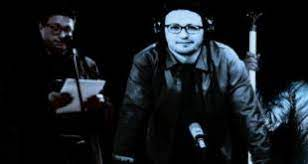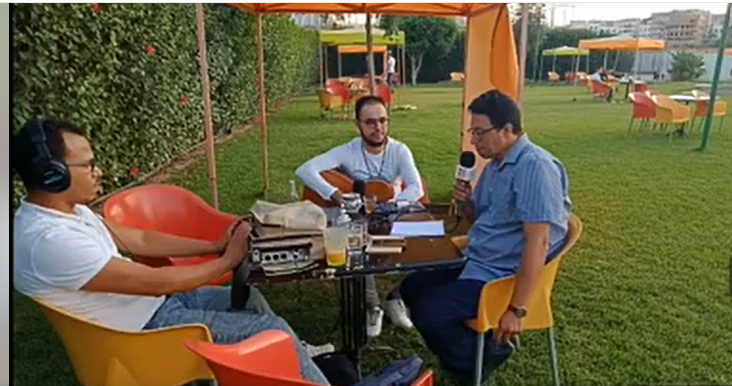Poet Mohamed Boumkosi to “The Amazigh World”: Writing has a sense of purification, as Aristotle says

He is the distinguished broadcaster, the son of the city of Nador or Silouan in particular, an ethereal voice from inside Studio 7 of the Amazigh Radio in Rabat, spinning the letters of the alphabet and haunting the word, so a poetic verse and then a poem, so that the reader finds himself in front of the throes of the birth of the book “Rakhzrath N Oraji” or “Looks of Waiting” born The first poetic of Mohamed Boumkosi.
In this dialogue, the poet Pomkusi tells us about his poetic experience and his first beginnings in writing, as well as his aspirations through it, and reveals to us that “writing has a sense of purification, as Aristotle says, and that finishing writing a poem is a new birth and a beautiful feeling.”
He also stresses that “the Amazigh library is in need of more creativity and production, although there is an awakening of a group of young poets at the level of production and issuance of collections of poetry, novels and stories.”
My poems and poems are directed to all segments and groups, and I always try to be universal and write for humanity.
Sir, we welcome you to the pages of the “Amazigh World” ?newspaper, beginning with who is Mohamed Boumkosi
First, thanks to the "Amazigh World" newspaper for hosting.
Mohamed Boumkoussy, from the city of Nador, exactly in Silouane. I obtained a baccalaureate degree from the Mohammed V High School in Nador, a bachelor’s degree from the University of Mohamed I in Oujda, and a diploma of advanced postgraduate studies in private law at the University of Mohamed V in Rabat. I am currently a researcher with a doctorate in business law. But I find my most pleasure in writing, especially in poetry.

Away from the radio, you recently released a collection of my poetry, “Rakhzarath N Uraji,” meaning “Looks of Waiting.” Can you tell us ?about this poetic baby
My poetry collection “Rakhzrath N Uraji” is my first and only book so far. It was published in 2020, coinciding with the onset of the Corona pandemic. Frankly, it is the juice of many years of effort. It contains a poem that has more than twenty years of history, written exactly in the year 1999, when I was a university student in Oujda. Most of the poems I wrote in Rabat. With the encouragement of a group of friends, artists and poets, they were credited with the birth of this baby. Here, I must thank Dr. Abdul Muttalib Al-Zizawi, who presented and thanked Professor Muhammad Farsi for setting and correcting the language and commissioning printing, as well as the creator Saeed Trizit in placing the cover image, and the artist Abdul Ali Bustati In redrawing the cover photo by hand and photographed by Mohamed Al-Haqouni, who took a personal photo of me in Al-Hoceima.. All of these have my full appreciation and respect.
The Diwan contains 17 poems with different themes according to the psychological state and time.
?Every poetic experience has effects. For you, as an Amazigh poet, what are the poetic trends that affected you
Of course, every poetic experience is subject to a process of influence and being affected. I always listened to great poets in the countryside such as Al-Walid Maymoon, Saeed Al-Moussawi, Omar Bomzoug, Al-Taher Jinnah and Ahmed Al-Zayani, may God have mercy on him... These poems are still stuck in my imagination, in addition to young poets at the time such as the poet Maymoon Al-Sahrawi and Abdul Hamid Al-Induzi...
?How did you get into the world of writing? What are the motives and influences
In the beginning, it was only attempts at writing, and I always hesitated before writing any poem to the point where I was content to memorize it only to my close friends. I still remember the first poem I wrote in 1995 and participated in it at the Mohammed V High School in Nador. I received encouragement from my teachers and classmates in high school, and then I entered the world of writing. Also, my great love for the Amazigh radio and listening to the committed Amazigh songs played a big role and was a strong motivation to go into writing.
?Why does Muhammad Bomkosi write, and for whom does he write
good question! Why do I write? When I write, I feel purified, as Aristotle says. When I finish writing a poem, I feel a new birth, pleasure and a beautiful feeling.
And if you read my poems and poems to me, you will find them addressed to all segments and groups, to mothers, women, children, the disadvantaged, youth and the elderly, but I always want to be universal and write for humanity.
When I write, I feel a purification, as Aristotle says, and when I finish writing a poem, I feel a new birth.
?Does the writer find himself through writing? And through which he achieves his aspirations
Of course, the writer or poet writes through what he feels and what he feels, and I find indescribable pleasure in writing, and the latter remains a means of self-realization and sharing that feeling with others, and my pleasure is greater when I touch the feelings, dreams and hopes of others, at that time I achieve self-fulfillment.

?What are the most important basic pillars for the success of the novel, story and poetry in your opinion
You cannot write without being a good reader and knowing who you are reading. Writing is mainly related to reading, reading, reading, and seeing others’ experiences in writing.
Reading opens horizons for creativity, expands the field of imagination and acquires expression skills...
?What do you think of the wave of social networking sites, and does it contribute to the reader's follow-up to the Amazigh literary production
Personally, I do not like the phenomenon of writing on social networking sites, although there are many who prefer to share their creativity through these spaces. I find that the paper book is the one that heals the anger and makes you feel that you have read a book of poetry, a novel, or a story.
Although we are in the era of sound, image and technological revolution, I find that these sites contribute more to the marketing and advertising of literary production than to the dissemination of creativity, and of course I respect those who find comfort in these sites.
?How do you evaluate the Amazigh poetic and novelist experience
The issue of evaluation is a relative matter. The poetic experience in the countryside, for example, at the level of creativity, poetic image and eloquence of words, was for the poets that I mentioned earlier, such as Al-Walid Maymoon, Saeed Al-Moussawi and Omar Boumzoug... Although many of them did not publish books until recently, such as Jinnah Al-Taher, for example, but we got to know their poems through The songs of artists and groups, currently there is an awakening of a group of young poets at the level of production and the issuance of collections of poetry, novels and stories, which is a positive step for documentation and codification, but the Amazigh library needs more creativity and production. Creators and writers to write, publish and create.
?The audience saw you kneeling on stage, through the play “Yeni Acherzen Tagnant”, tell us about this experience
In addition to writing, I have modest experiences in theatre, cinema and television. It is true that I had a distinguished experience on stage recently through the play “Yeni Acherzen Thagnant” by Ahmed Zahid, with the participation of a group of distinguished actors. Frankly, this play brought me back to the stage after years of absence from the stage.
This play is a new form and somewhat different from the Amazigh theatrical works we are familiar with in the countryside. It is included in what is called “theatre of the absurd” or “theater within a theatre”. This play has received support from the Ministry of Culture and we are in the process of showing it in a number of Moroccan cities as part of the tours. theatrical.
?What are your future projects
After I finished writing the script for my first short film, I am now working on publishing my second book of poetry, which I hope will see the light of day during this year, and write a new play.
Free word...
Thank you for the invitation, you gave me the opportunity and space to reveal and meet with the readers and the public.
Interviewer: Khair Al-Din Al-Jami
Source : websites

